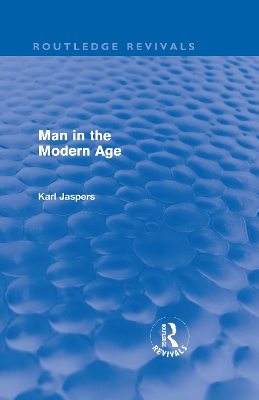Routledge Revivals
3 total works
The essay on Max Weber commemorates a man Jaspers knew personally and ardently admired.
The main essay in the collection is an exhaustive, three part study of Descartes: analysing Descartes' new philosophical operation, Descartes' Method, and the position of his philosophy within the wider historical context of philosophical thought.
World history
The present and the future
The meaning of history
First published in English in 1933, this detailed philosophical examination of the contemporary state and nature of mankind is a seminal work by influential German philosopher Karl Jaspers. Elucidating his theories on a variety of topics pertaining to contemporary and future human existence, Man in the Modern Age is an ambitious and wide-ranging work, which meditates upon such diverse subjects as the tension between mass-order and individual human life, our present conception of human life and the potential for mankind’s future existence. Written shortly before the accession to power of Hitler and National Socialism, this is not only an important philosophical work, but also an insightful and intriguing historical document.


